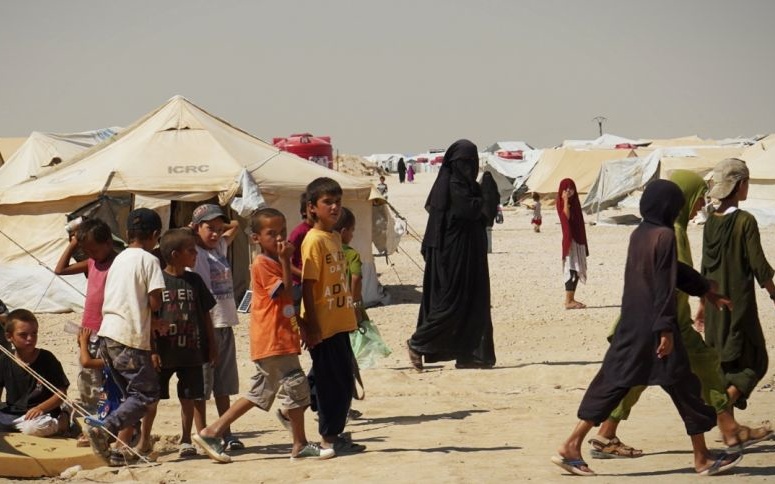Women and children in the al-Hawl refugee camp in Hasakah Province in northeast Syria in 2020
Amnesty International reports on ongoing human rights abuses, torture, and death in detention camps in northeast Syria, more than five years after the removal of the Islamic State from its last village.
About 56,000 men, women and children remains in the al-Hawl and al-Roj camps and 27 detention facilities. Most of them have been “arbitrarily and indefinitely detained“, with some abused by beatings, stress positions, and electric shocks.
The camps were established by the autonomous Kurdish administration and its Syrian Democratic Forces, backed by US troops and officials, after ISIS was expelled from its last village of Baquba in March 2019.
The detainees include Syrians, Iraqis, and foreign nationals from an estimated 74 other countries. While many are Islamic State members and their families, others have no affilation with the group and some are victims of ISIS violence.
Small groups of foreign nationals have been repatriated in the past five years, but despite international calls for action, many countries have been reluctant to take back their citizens.
An estimated 1,000 Syrian and foreign boys, and young men detained as boys, are held in detention facilities — some labelled as youth “rehabilitation” centers. They are also subjected to torture and ill-treatment. Only about 1 in 10 has been charged with committing a crime.
Agnès Callamard, Amnesty’s Secretary General, summarized:
The autonomous authorities have committed the war crimes of torture and cruel treatment, and likely committed the war crime of murder.
Children, women and men held in these detention camps and facilities suffer shocking cruelty and violence. The US government has played a central role in the creation and maintenance of this system in which hundreds have died preventable deaths, and must play a role in changing it.
This detention system violates the rights of people with perceived IS affiliation, and has also failed to deliver justice and accountability for the victims and survivors of IS crimes.
Amnesty researchers travelled to northeast Syria on three occasions between September 2022 and August 2023. They interviewed 314 people for the report.
“A Point Where I Could Not Scream Any More”
All eight former detainees with whom Amnesty spoke said the SDF deprived them of adequate food and water. They cite inhumane conditions such as overcrowding, lack of ventilation, and extreme temperatures. The abuse, conditions, and lack of medical care led to outbreaks of disease, with the the deaths of hundreds of people.
One detainee said that 17 people in his cell died when the authorities turned off the exhaust fan one day in 2020. Three sid the corpses of those who died in Sini were deposited in a mass grave referred to as a “ditch”.
“Yusuf” recounted:
There was no specific day or specific hour, or a way of torture….The worst was when they came inside the room… carrying plastic pipes, cables, steel pipes, and they beat us everywhere….
Every 15 days, they would take us out, in the yard, all naked… [The guards] were raping people with [a] stick….
Once they took me [out of the cell] with another guy… They brought an electricity cable from the generator, and they kept torturing us by electricity….I think the guy next to me died. He stopped moving and screaming….I reached a point where I could not scream any more.
Women in the camps also spoke of gender-based violence when they were taken to detention facilities. One said:
I was given electric shocks. I was pregnant at the time. The [interrogator] knew, he told me: “I am going to force you to have a miscarriage”, and that’s what he did.
The researchers asked questions of the Kurdish authorities and US government, each of whom responded in writing.
Kurdish officials cited difficult conditions, including ongoing armed conflicts, and criticized the “international community and global partners” for failing to “fulfill their legal and moral obligations”. They said countries and the international community had left foreign national “alone in dealing with the consequences” of the fight against the Islamic State.
The US State Department proclaimed American efforts to address the “dire humanitarian and security challenges”. It urged all actors in Syria, including the SDF, to “uphold human rights”, and insisted that it works with groups and individuals in the SDF who are “appropriately vetted”.
The Americans said the only solution is the “repatriation and return of displaced persons and detainees to their countries of origin”, so perpetrators can “be held responsible for their crimes by competent rights respecting judicial processes”.
Callamard addressed the Kurdish authority; the SDF; and US officials:
They should conduct an urgent screening process to identify individuals in detention who should be immediately released, with a particular focus on victims of IS crimes and at-risk groups. While this is underway, they must ensure that the violations being committed are stopped immediately, and reports of torture and death are independently investigated.

